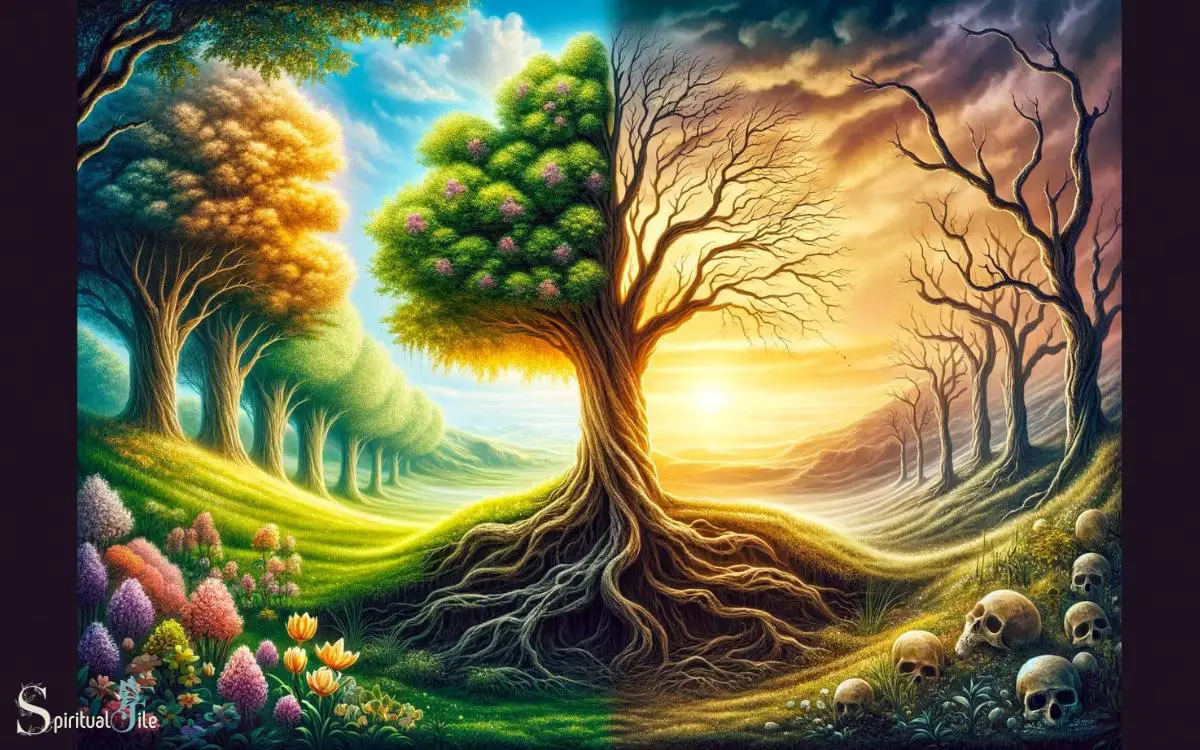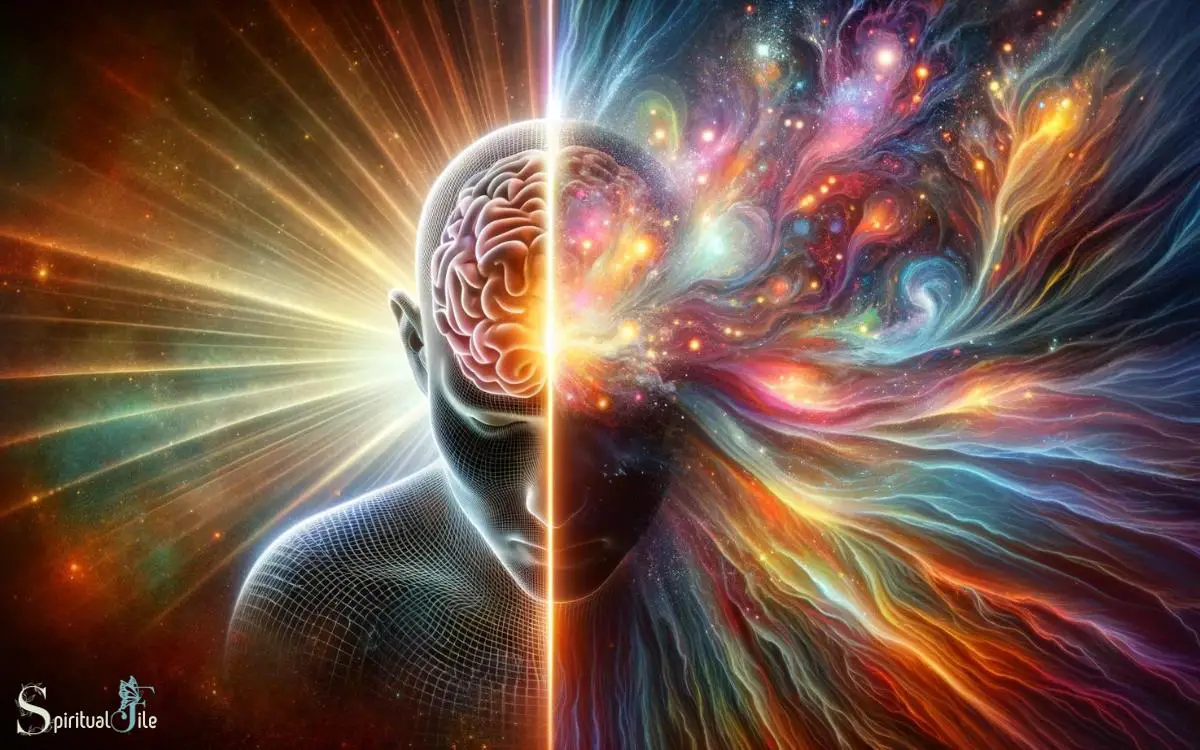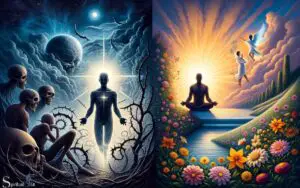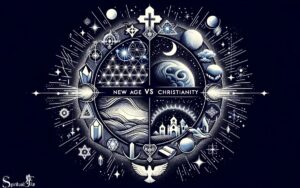Spiritual Death Vs Physical Death: Beliefs!
Spiritual death and physical death are two fundamentally different concepts that affect individuals in unique ways. Physical death refers to the cessation of all biological functions that sustain a living organism, resulting in the end of that organism’s life.
On the other hand, spiritual death is a metaphorical term used to describe a state of being where an individual is considered to be separated or disconnected from the essence of life, often in a religious or existential context.
Spiritual death is not a literal end of life but rather a condition often associated with a loss of meaning, purpose, or connection to a higher power or community. It can occur despite physical health and vitality.
For example, someone may experience spiritual death if they feel completely detached from their values, beliefs, or the people around them.
Physical death, in contrast, is a natural process that eventually happens to all living beings and is marked by the irreversible breakdown of bodily functions.
Spiritual Death:
– Loss of meaning or purpose
– Disconnection from spiritual or religious beliefs
– Feeling of emptiness or isolation
Physical Death:
– End of biological functions
– Irreversible cessation of life
– Recognized by medical and legal definitions
Exploring the dichotomy between spiritual and physical death sheds light on the complex nature of human existence, where the body and soul are intertwined yet distinctly separate in their journeys.

Key Takeaway
5 Aspects: Spiritual Death Vs Physical Death
| Aspect | Spiritual Death | Physical Death |
|---|---|---|
| Nature | Loss of inner vitality | Cessation of bodily functions |
| Consequences | Separation from divine | End of biological life |
| Existential Impact | Profound transformation | Irreversible termination |
| Beliefs | Various religious meanings | Universally recognized |
| Subjective Experience | Personal and spiritual | Inevitable and biological |
The Nature of Physical Death
The nature of physical death is an inevitability that all living organisms experience. It marks the cessation of biological functions essential for life. From a biological perspective, it involves the irreversible loss of vital functions such as heartbeat, respiration, and brain activity.

Despite medical advancements, death remains an inevitable conclusion to life. The process of dying can vary, influenced by factors such as age, health, and the cause of death.
While it is a universal experience, the understanding and acceptance of physical death differ across cultures and belief systems.
Addressing the practical, emotional, and spiritual aspects of physical death is essential for individuals and their loved ones. Ultimately, acknowledging the reality of physical death can inspire a deeper appreciation for life and the relationships we cherish.
The Essence of Spiritual Death
Exploring the essence of spiritual death involves delving into the metaphysical and existential implications of the human experience, transcending the physical realm to contemplate the nature of consciousness and the soul.

To understand the essence of spiritual death, consider the following:
- Separation from the Divine: Spiritual death is often perceived as a disconnection from the divine source or a state of spiritual emptiness, where the individual feels detached from their true essence.
- Loss of Meaning and Purpose: It entails a profound sense of meaninglessness and purposelessness, causing existential anguish and a lack of direction in life.
- Absence of Inner Harmony: Spiritual death signifies the absence of inner harmony and peace, leading to inner turmoil and a feeling of being spiritually adrift.
This examination of the essence of spiritual death sets the stage for understanding its impact on human consciousness.
Impact on Human Consciousness
Delving into the impact of spiritual death on human consciousness reveals profound existential and metaphysical implications.
When an individual experiences spiritual death, their consciousness undergoes a fundamental shift. It can lead to a sense of disconnection from the deeper aspects of existence, causing feelings of emptiness and purposelessness.

This disconnection from spiritual vitality can also result in a diminished capacity for empathy, compassion, and understanding of the interconnectedness of all life.
Profound existential questions may arise, challenging the individual’s sense of meaning and significance in the world.
Moreover, spiritual death can lead to a heightened focus on material pursuits, neglecting the nourishment of the soul. Consequently, the impact on human consciousness is significant, influencing perceptions, attitudes, and the overall quality of life.
Coping With Mortality
When confronted with mortality, individuals experiencing spiritual death may grapple with the existential implications of their disconnection from spiritual vitality. Coping with mortality in the face of spiritual death can be a challenging and complex process.

Here are three key considerations for individuals navigating this difficult journey:
- Seeking Meaning: Finding meaning in life and the acceptance of mortality can help individuals cope with spiritual death. This may involve exploring existential questions and seeking purpose through various spiritual or philosophical avenues.
- Connection and Support: Building connections with others who share similar beliefs or experiences can provide a supportive network for individuals dealing with spiritual death and navigating their mortality.
- Self-Reflection and Growth: Engaging in self-reflection and personal growth can aid in coping with mortality. This may involve practices such as mindfulness, meditation, or seeking guidance from spiritual leaders or counselors.
Resurrection and Rebirth
The process of resurrection and rebirth can provide individuals experiencing spiritual death with a renewed sense of purpose and connection to spiritual vitality.
This transformative experience allows individuals to shed their old, spiritually dead selves and emerge with a revitalized outlook on life.

Rebirth involves a deep inner transformation, often accompanied by a newfound understanding of one’s purpose and a heightened awareness of the interconnectedness of all life.
It can bring about a profound sense of renewal and rejuvenation, enabling individuals to embrace life with fresh vigor and enthusiasm.
Through the process of resurrection and rebirth, individuals can transcend the spiritual death that once weighed them down, and instead, embrace a life filled with spiritual vitality and purpose.
This transformation can lead to a deeper appreciation for the interconnectedness of all living beings, fostering a sense of unity and compassion.
Embracing Transcendence
Frequently, individuals experiencing spiritual death can embrace transcendence through a process of inner transformation and renewed spiritual connection.

This journey towards transcendence involves the following key elements:
- Self-Reflection: Embracing transcendence often begins with introspection and deep self-reflection. Individuals need to assess their beliefs, values, and actions, and identify areas that require spiritual growth and alignment.
- Seeking Guidance: Embracing transcendence may involve seeking guidance from spiritual mentors, counselors, or religious leaders. These individuals can provide wisdom, support, and insight to aid in the spiritual transformation process.
- Practicing Mindfulness: Engaging in mindfulness practices such as meditation, prayer, or yoga can help individuals cultivate a heightened sense of awareness, connection, and transcendence.
How do different beliefs view the concept of spiritual and physical death?
Physical vs spiritual death is perceived differently among religions. Some view physical death as the end of life, while spiritual death as separation from a higher power. In contrast, others believe in the continuation of spiritual existence after physical death, leading to different interpretations of the afterlife.
FAQ About Spiritual Death Vs Physical Death
What Are the Common Misconceptions About Physical Death?
Common misconceptions about physical death include the belief that it is always a peaceful process, that everyone experiences the same afterlife, and that it always comes with closure for loved ones.
Understanding these misconceptions is important.
How Does the Concept of Spiritual Death Differ Across Different Religious Beliefs?
The concept of spiritual death varies across different religious beliefs, encompassing the idea of separation from the divine, loss of spiritual connection, or the absence of inner peace.
Each faith offers unique perspectives on this profound aspect of human existence.
Can the Fear of Mortality Impact Our Daily Lives and Decision-Making?
The fear of mortality can profoundly impact daily life and decision-making. This universal concern can drive individuals to seek security and meaning, influencing their choices and priorities in various aspects of life.
Is There a Connection Between Spiritual Death and Mental Health Issues?
The connection between spiritual death and mental health issues is a complex and multifaceted topic.
It involves examining individuals’ beliefs, values, and sense of purpose, and how these factors intersect with mental well-being. Understanding this link requires a holistic approach.
How Can One Find Meaning and Purpose in Life After Experiencing a Spiritual Death?
Finding meaning and purpose after spiritual death can be a profound journey of self-discovery and growth.
Through reflection, therapy, and connection with supportive communities, individuals can rebuild their sense of purpose and discover new pathways to fulfillment.
Conclusion
The juxtaposition of spiritual death and physical death highlights the duality of human existence.
Like the cycle of nature, physical death represents the end of one stage and the beginning of another. Similarly, spiritual death symbolizes the shedding of old beliefs and the emergence of a renewed consciousness.
Both forms of death are integral to the human experience, representing the eternal cycle of life, death, and rebirth.






